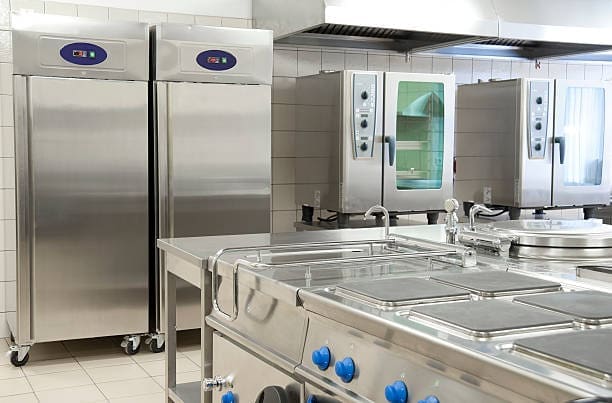Running a successful catering business requires the right tools to prepare, store, and serve food efficiently. Investing in high-quality commercial catering equipment is crucial for maintaining standards, ensuring customer satisfaction, and optimizing your workflow. Whether you’re setting up a new kitchen or upgrading your current setup, understanding your equipment needs is key.
In this guide, we’ll explore the types of commercial catering equipment every business needs, tips for selecting the best tools, and how to make cost-effective purchasing decisions.

Why Commercial Catering Equipment Is Crucial
Catering businesses rely on equipment that can withstand heavy usage and deliver consistent performance. Unlike domestic appliances, commercial catering equipment is specifically designed for large-scale food preparation and storage, ensuring compliance with health and safety standards.
Benefits of Using Commercial Catering Equipment:
- Efficiency: High-powered machines speed up food preparation, cooking, and cleaning processes, saving time during busy periods.
- Durability: Built to last, commercial-grade equipment handles the daily demands of a professional kitchen.
- Food Safety: Meets health regulations by maintaining proper temperatures and cleanliness standards.
- Cost Savings: Though the initial investment may be higher, commercial equipment’s longevity reduces replacement and repair costs over time.
Essential Types of Commercial Catering Equipment
A well-equipped kitchen requires a variety of tools to meet diverse needs. Here are the main categories of commercial catering equipment to consider:
1. Cooking Equipment
Efficient cooking appliances are the backbone of any catering operation. Some essentials include:
- Ovens: Convection ovens, combination ovens, and pizza ovens for baking and roasting.
- Ranges: Gas or electric ranges for versatile cooking.
- Grills and Griddles: Ideal for grilling meats, vegetables, and other dishes.
- Fryers: Perfect for deep-fried menu items like chips, chicken, and pastries.
Tip: Choose appliances with adjustable settings to accommodate a variety of cooking styles.
2. Refrigeration Equipment
Maintaining the freshness and safety of ingredients is non-negotiable. Investing in reliable refrigeration is crucial:
- Fridges: Upright, under-counter, and walk-in fridges to store perishables at the correct temperature.
- Freezers: Chest and upright freezers for long-term storage.
- Blast Chillers: Rapidly cool food to meet health standards.
Tip: Look for energy-efficient models to reduce electricity costs over time.
3. Food Preparation Equipment
Prepping ingredients quickly and consistently is essential in a busy kitchen. Common tools include:
- Mixers: Planetary mixers and dough mixers for bakeries and pizzerias.
- Food Processors: Perfect for chopping, slicing, and blending.
- Meat Slicers: Ensures precision when slicing deli meats and cheeses.
Tip: Choose versatile machines with multiple attachments for added functionality.
4. Storage Solutions
Effective storage helps you stay organized and reduces waste. Key storage equipment includes:
- Shelving Units: Stainless steel shelving for dry storage and easy cleaning.
- Food Containers: Airtight containers for preserving ingredients.
- Racking Systems: Optimize space for plates, utensils, and trays.
Tip: Invest in durable, corrosion-resistant materials to ensure longevity.
5. Cleaning Equipment
Maintaining cleanliness is crucial in the food industry. Commercial cleaning equipment includes:
- Dishwashers: High-capacity machines for washing large volumes of dishes.
- Glasswashers: Ensure spotless glasses for bars and restaurants.
- Sanitizing Stations: For quick cleaning of surfaces and tools.
Tip: Choose machines with energy-saving features to lower operational costs.
Tips for Choosing the Right Commercial Catering Equipment
With so many options available, selecting the best commercial catering equipment can feel overwhelming. Follow these tips to make informed decisions:
1. Assess Your Needs
Understand your menu and kitchen workflow to identify the equipment you’ll use most frequently. Focus on items that improve efficiency and are essential to your operations.
2. Consider Your Space
Measure your kitchen to ensure new equipment fits comfortably. Optimize your layout to allow for smooth movement and easy access to tools.
3. Prioritize Energy Efficiency
Look for equipment with high energy ratings to save on utility bills and reduce your environmental footprint. Energy-efficient appliances often qualify for rebates or incentives.
4. Check Build Quality
Invest in durable materials like stainless steel, which is resistant to corrosion, easy to clean, and long-lasting.
5. Think About Maintenance
Choose equipment that’s easy to clean and maintain. Regular servicing will prolong the lifespan of your appliances and prevent costly repairs.
New vs. Used Commercial Catering Equipment
When purchasing commercial catering equipment, you’ll need to decide whether to buy new or used. Both options have their pros and cons:
Buying New Equipment
- Pros: Comes with warranties, the latest features, and no prior wear and tear.
- Cons: Higher upfront cost.
Buying Used Equipment
- Pros: More affordable and readily available. Often refurbished by reputable dealers.
- Cons: May have limited warranties and require closer inspection.
Tip: If buying used, purchase from a trusted supplier who provides detailed maintenance records and refurbishment details.
Maintaining Your Commercial Catering Equipment
Proper maintenance ensures your equipment performs reliably and lasts longer. Here’s how to care for your tools:
- Clean Daily: Wipe down surfaces, remove food debris, and sanitize high-touch areas.
- Inspect Regularly: Check for signs of wear, such as loose connections or unusual noises.
- Schedule Servicing: Hire professionals for routine maintenance to catch potential issues early.
- Follow Manufacturer Guidelines: Adhere to user manuals for cleaning and usage instructions.
Final Thoughts
Investing in the right commercial catering equipment is essential for any successful catering business. From cooking appliances to refrigeration and storage solutions, having the right tools streamlines your operations and helps maintain high-quality standards.
Whether you’re buying new or used, carefully consider your needs, prioritize energy efficiency, and focus on durability to get the best value for your investment. With proper maintenance and care, your commercial catering equipment will serve your business reliably for years to come.
You can find a range array of our commercial catering equipment here!

